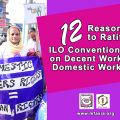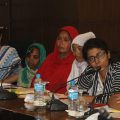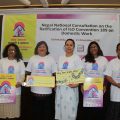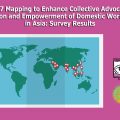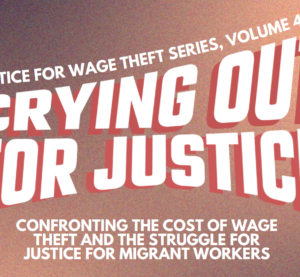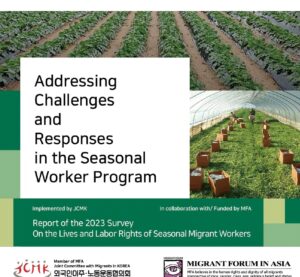MFA Speaks at the EDD High Level Panel on Women and Girls on the Move
— June 22, 2018Migrant Forum in Asia was invited to speak at the high level panel on Women and girls on the Move: Towards Safer Work and Migration for Women, Assessing Determinants of Vulnerability and Women’s Empowerment through Migration. The Panel was part of the 2018 European Development Days and organized by the Swiss Agency for Development and Cooperation, UN Women, International Organization for Migration, the International Labour Organization, Migant Forum in Asia, the Africa-Europe Diaspora Development Platform. Migrant Forum in Asia’s presentation focused on initiatives of Asian CSOs in empowering and mobilizing around rights of women migrant workers.
Migration is one of the defining features of the 21st century contributing significantly to all aspects of economic and social development, and as such will be key to achieving the Sustainable Development Goals (SDGs). Safe, orderly and regular migration, allow women to develop their skills, flourish as entrepreneurs, and contribute to economic growth. The 2030 Agenda explicitly recognizes the economic value of migrants; but women and girls, representing 48 per cent of all international migrants, are still exposed to gender specific vulnerabilities. The High Level Panel, moderated by the Swiss Agency for development and cooperation, discussed how the EU and its partners can empower women and girls to improve their socioeconomic status.
Migrant Forum in Asia: Empowering and Mobilizing Women Migrant Workers
A large part of the success in women migrant’s empowerment particularly migrant domestic workers, is due to the role of CSOs have played in terms of creating awareness and implementing pre-departure training programs among migrant workers before migrants are deployed. This has been useful in terms of keeping migrants informed of challenges and opportunities in countries of destination.
The pre-departure programs created social networks between migrant domestic workers and support networks in both countries of destination and origin.Created space for migrants to voice out challenges and issues in countries of destination.
One must put this in the context that many countries of origin, South Asian countries in particular have become almost dependent on the deployment of domestic workers. This has both an upside and a downside. In some ways the deployment of women domestic workers has become a strategy for deployment of labour and to remittances for many countries of origin. It is also seen as a recognition of right to mobility for women, in this case migrant domestic workers.
What we have also seen in this whole process is the recognition of domestic work as work because of domestic workers coming together in different spaces, in different configurations and through a support network. Which has led to, in the corridor that we have between South Asia and Gulf countries, a lot of the Gulf Countries now recognizing domestic work as work. In the most recent months we have seen changes in policy in that have been helpful this regard. One example is in the UAE where,the most recent development there has been that domestic work is now under the ministry of labour. Previously it was not in under the purview of the ministry of labour, so when issues come up form a labour perspective, it was difficult for the ministry of labour to take this up. We are now talking about standard contracts and skills development for domestic workers in the Gulf Region. There has been a lot of shift in the discourse from looking at vulnerability to seeing how women can be empowered.
As Migrant Forum in Asia this has been the focus of our activity. We have always felt that change happens when those impacted have the opportunity to express themselves. In this regard, when migrants are their own advocates for change.
As MFA a lot of our programming is around how do we create spaces for migrants and migrant workers to find their voice in different spaces from national, to regional, to international. And we have been able to bring them to several such spaces. For example when the ILO was discussing the convention 189, on domestic work, as MFA we prepared grassroots organizations and migrant domestic worker organizations, and worked with them in preparation to engage in the debate during the ILC. This led to the ILO Convention 189.
We do this kind of representation work at the regional level as well with the Abu Dhabi Dialogue, Colombo Process, which are inter-governmental spaces. We mobilize prior to the event or in parallel in terms of giving input and participating in these processes.
In the Human Rights Council, we brought grassroots organizations to come forward tell their stories to be witnesses to some of the issues that are on the table for discussion.
In the GFMD process we have been part of mobilizing CSOs from the ground to these intergovernmental spaces and at the same time creating our own space. It is not always about migrants finding spaces at the international level but it also about how migrants find their own space to talk among themselves. This has a very empowering dimension to it when people come from different regions, different nationalities, different communities come together and are able to share their experiences.
As MFA this has been one of the principle ways we have used as a methodology of organizing. Today within the network, we have seen and are able to leverage, bring forward at anytime grassroots organizers who are able to go on to become leaders themselves. This has been replicated at the global level through the Global Coalition for Migration (GCM).
The feminisation of migration has been a hot topic for many years. Women now make up half of all migrants. They often work in healthcare and domestic services. Both fields are experiencing growing demand in Europe and other parts of the world. When migrants take over such chores, it takes the burden off European women who can more easily pursue professional careers.
Healthcare and domestic work tend to rank on the low end of the pay scale. Domestic work is particularly hard to regulate; often it is informal. Since it is diffuse and takes place in family homes, it is hard for labour inspectors to track. Meanwhile, only 39 countries have ratified Convention 189 of the International Labour Organization that covers the sector.
Women migrants contribute to their country of origin by sending half of all remittances home – even though they earn less, on average, than men due the gender wage gap. Eliminating that would probably boost remittances, which in most countries are significantly more important than foreign aid. Many South Asian countries have become highly dependent on remittances from women working abroad, many in the Persian Gulf region. By contributing to development, remittances may stave off future waves of migration.
Most human trafficking involves women and girls. Generally, these individuals are looking for new opportunities abroad and end up being exploited by criminal gangs. Because people make money, it is important to look at the business model. The entire value chain should be criminalised. This would include people who help transport, feed and house the victims, as well as those who knowingly use the services provided by and goods produced by trafficked individuals. Law enforcement should follow the money trail.
Bad governance represents an important “push factor” for migrants who leave their home countries. They are forced out by violence or enticed by better opportunities elsewhere. Good governance might encourage more people to try to make a go of it at home.
To watch the full video of the panel click the link below:

